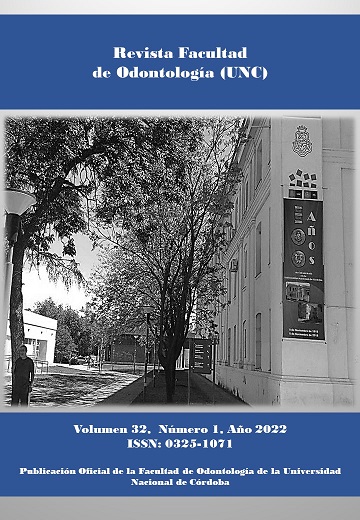Teaching and learning of Cell Biology in higher education in the context of virtuality in the COVID-19 pandemic
Keywords:
Cell biology education, pandemic, Spain, ArgentinaAbstract
The objective of this work was to determine and compare the teaching-learning strategies implemented in the teaching of Cell Biology at the National University of Córdoba (UNC)-Argentina and at the University of Granada (UGR)-Spain, in order to carry out the review and curricular adjustment of the academic offer in the UNC School of Dentistry and compare the academic conditions of students, in the 2020 and 2021 school years, in both universities. The strategies that were implemented to continue with higher education, in virtual mode, are not enough for students to understand and learn skills, concepts, and attitudes required for university studies. Although the hybrid modality, that is to say, the dictation of the theoretical concepts in virtual modality and the practices of face-to-face modality, would allow access to higher studies to students who have unfavorable economic conditions
References
1. Bond M, Bedenlier S, Marín VI, Händel M. Emergency remote teaching in higher education: mapping the first global online semester. Int J Educ Technol High Educ. 2021;18(1):50. doi: 10.1186/s41239-021-00282-x.
2. Allaire JL. Assessing Critical Thinking Outcomes of Dental Hygiene Students Utilizing Virtual Patient Simulation: A Mixed Methods Study. J Dent Educ. 2015; 79(9):1082-92.
3. Costa-Silva D, Côrtes JA,Bachinski RF,Spiegel CN, Alves GG. TeachingCell BiologytoDental Studentswith a Project-Based Learning Approach. J Dent Educ.2018; 82(3):322-331. doi: 10.21815/JDE.018.032.
4. Hanlon JP, Prihoda TJ, Verrett RG, Jones JD, Haney SJ, Hendricson WD. Critical Thinking in Dental Students and Experienced Practitioners Assessed by the Health Sciences Reasoning Test. J Dent Educ. 2018;82(9):916-920. doi: 10.21815/JDE.018.089.
5. Whitney EM, Aleksejuniene J, Walton JN . Critical Thinking Disposition and Skills in Dental Students: Development and Relationship to Academic Outcomes. J Dent Educ. 2016; 80(8):948-58.
6. Katzman SD, Hurst-Kennedy J, Barrera A, Talley J, Javazon E, Diaz M, Anzovino ME. The Effect of Specifications Grading on Students' Learning and Attitudes in an Undergraduate-Level Cell Biology Course. J Microbiol Biol Educ. 2021; 22(3):e00200-21. doi: 10.1128/jmbe.00200-21.
7. Dirks C. The current status and future direction of biology education research. Paper presented at the Second Committee Meeting on the Status, Contributions, and Future Directions of Discipline-Based Education Research, Washington, DC. 2011. https://sites.nationalacademies.org/cs/groups/dbassesite/documents/webpage/dbasse_072582.pdf.
8. Farooq I, Ali S. Comparison of the perceived relevance of oral biology reported by students and interns of a Pakistani dental college. Eur J Dent Educ. 2014; 18(4):203-6. doi: 10.1111/eje.12086.
9. Scheven BA. Perceived relevance of oral biology by dental students. Eur J Dent Educ. 2012; 16(1):e64-72. doi: 10.1111/j.1600-0579.2011.00677.x.
10. Park H, Shim S, Lee YM. A scoping review on adaptations of clinical education for medical students during COVID-19. Prim Care Diabetes. 2021:S1751-9918(21)00176-5. doi: 10.1016/j.pcd.2021.09.004
Published
Issue
Section
License

This work is licensed under a Creative Commons Attribution-NonCommercial-ShareAlike 4.0 International License.
Aquellos autores/as que tengan publicaciones con esta revista, aceptan los términos siguientes:
- Los autores/as conservarán sus derechos de autor y garantizarán a la revista el derecho de primera publicación de su obra, el cuál estará simultáneamente sujeto a la Licencia de reconocimiento de Creative Commons que permite a terceros:
- Compartir — copiar y redistribuir el material en cualquier medio o formato
- La licenciante no puede revocar estas libertades en tanto usted siga los términos de la licencia
- Los autores/as podrán adoptar otros acuerdos de licencia no exclusiva de distribución de la versión de la obra publicada (p. ej.: depositarla en un archivo telemático institucional o publicarla en un volumen monográfico) siempre que se indique la publicación inicial en esta revista.
- Se permite y recomienda a los autores/as difundir su obra a través de Internet (p. ej.: en archivos telemáticos institucionales o en su página web) después del su publicación en la revista, lo cual puede producir intercambios interesantes y aumentar las citas de la obra publicada. (Véase El efecto del acceso abierto).

